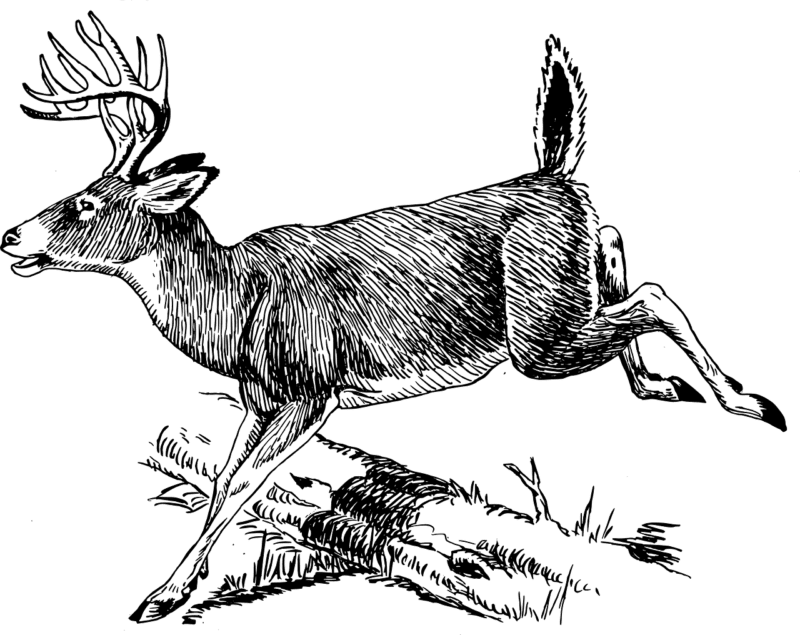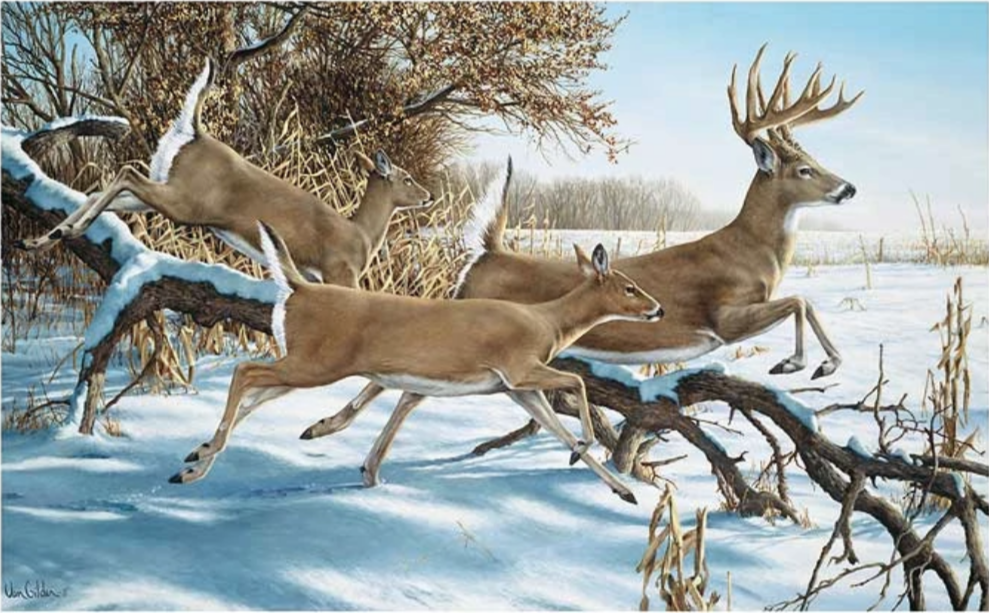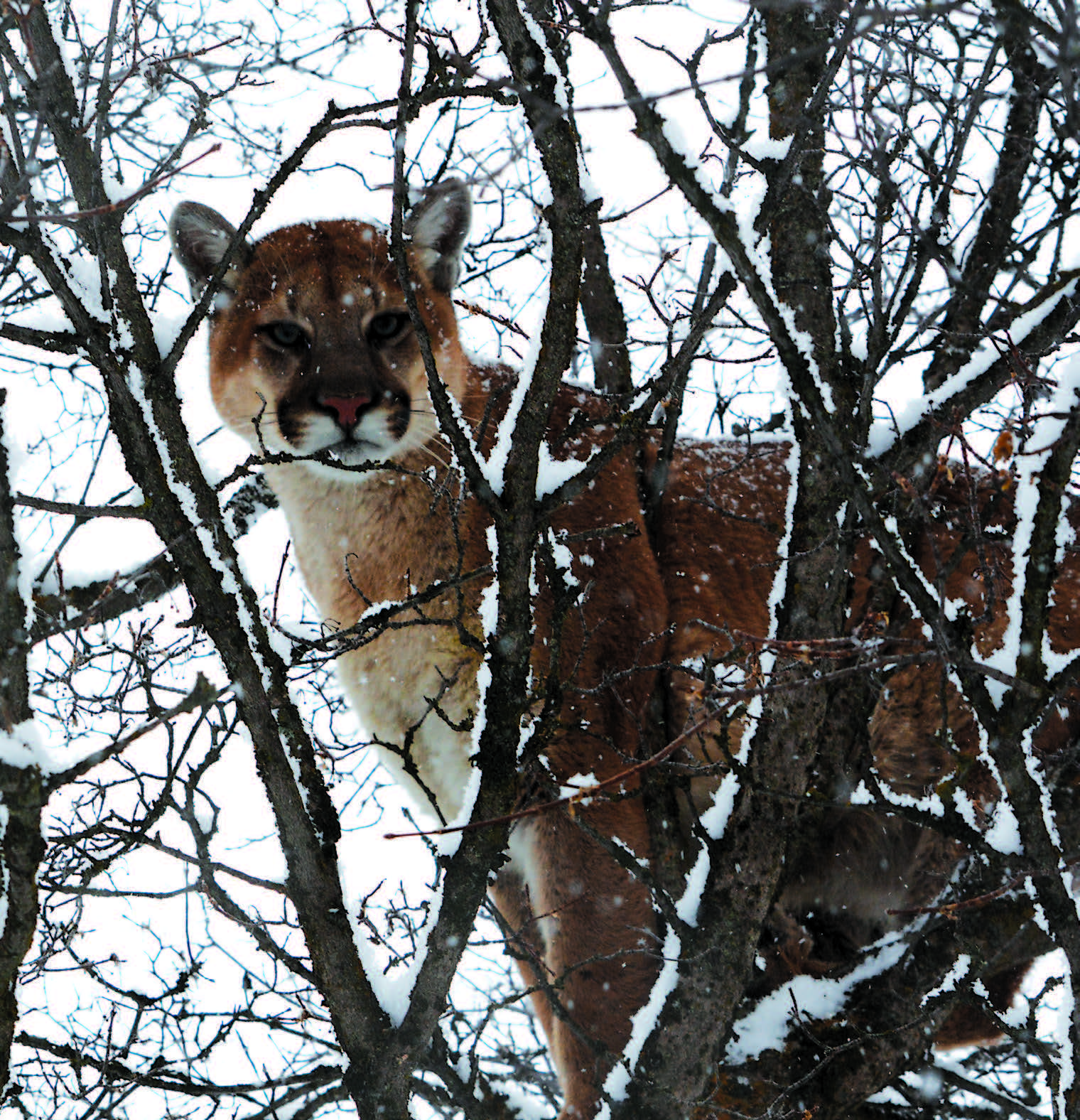On the plantations that I know, deer hunting on Christmas Day is as natural as a Christmas tree, or kissing one’s sweetheart under the mistletoe.
After breakfast we gather on the plantation porch, and I smell the yellow jasmine that is tossing her saffron showers up the tall white columns. In the flower garden two red roses are blooming. In the wild orange trees beside the house myriads of robins, cedar waxwings and a few wood-thrushes are having their Christmas breakfast. A hale, dewy wind breathes from the mighty pine forest.
The whole landscape, though bathed in sunshine, is still fresh with the beauty of the morning. Now the negro hunters come ’round the side of the house, leading our horses and followed by a pack of hounds. A rather motley crew they are, I think, for few plantations can boast of full-blooded stag-hounds; but they know their business. What they lack in appearance they supply in sagacity.
There is, I suppose, no grander sport in the whole world than riding to hounds after deer; and this is a sport typical of a plantation Christmas. It is almost a religious rite, and it never fails to supply the most thrilling entertainment for visitors. Indeed, I do not know exactly what the rural South would do without deer hunting as a diversion. Even in the cities, when distinguished guests arrive, the primary entertainment always provided is a stag hunt.
Nor is such a matter at all difficult to arrange. A city like Charleston is full of experts in this fascinating lore; and these nimrods are ever ready to leave all else to follow the deer. During the Great War, when many notable officials were in Charleston, they were exceedingly diverted by this practice of deer hunting. It seemed to take them centuries back, to the time when the cavaliers of Shakespeare’s time rode to hounds in the New Forest, in Sherwood, and in Windsor. In the coastal country, deer are, and have always been, plentiful; and I believe that they are so used to being hunted that they are inured to the surprise and the rigor of it.
Soon we are astride our mounts, turning them down the live-oak avenue toward the deep pinelands. As we ride down the sandy road, we are on the lookout for deer tracks; and these are crossing and recrossing the damp road. The negro hunters who have charge of the pack have to use all their powers of elocution to persuade the hounds not to make a break after certain hot trails. The horses seem to know and to enjoy this sport as well as the men and the dogs do. No horse can be started more quickly or stopped more abruptly than one trained to hunt in the woods.
We start a stag in the Crippled Oak Drive, and for miles we race him; now straight through the glimmering pinelands, sun-dappled and still; now through the eerie fringes of the ocean, an inviolate sanctuary, made so by the riotous tangle of greenery; now he heads for the river; and we race down the broad road to cut him off—down the very same stretch of road that in Revolutionary days the planters of the neighborhood used as a racetrack.
There is a stretch of three miles, perfectly straight and level, broad and lying a little high. Down this we course. But the crafty buck doubles and heads northward for the sparkleberry thickets of the plantation. I race forward to a certain stand, and just as I get there, he almost jumps over me!
The dogs are far behind; and the stag gives the appearance of enjoying the race. Away he sails, his stiffly erect, snowy tail flushing high above the bay-bushes. I await the arrival of the dogs, and soon they come clamoring along. I slip from my horse and lead him into the bushes. I love to watch running hounds when they do not observe me. They always run with more native zest and sagacity when they are going it alone.
A rather common dog, of highly doubtful lineage, is in the lead. The aristocrats come last. I am always amused over the manner in which full-blooded hounds perform the rite of trailing. This business is a religion with them. They do not bark, or do anything else so banal and bourgeois; they make deep-chested music, often pausing in the heat of a great race to throw their heads heavenward and vent toward the sky perfect music. Their running is never pell-mell.
 A good hound is a curious combination of the powers of genius: he is Sherlock Holmes in that he works out infallibly the mazy trail; he is Lord Chesterfield in that he does all things in a manner becoming a gentleman; and he is a grand opera star, full of amazing music.
A good hound is a curious combination of the powers of genius: he is Sherlock Holmes in that he works out infallibly the mazy trail; he is Lord Chesterfield in that he does all things in a manner becoming a gentleman; and he is a grand opera star, full of amazing music.
I get a never-failing thrill out of listening to hounds and out of watching them at close hand. To me it appears that the music they make depends much upon their environment for its timbre. And as they course over hills and dip into hollows, as they ramble through bosky watercourses or trail down roads, as the leafy canopies over them deepen or thin, their chorus hushes and swells, affording all the “notes with many a winding bout” that the best melody offers.
Our stalwart buck makes almost a complete circle, outwits us, enters the mysterious depths of the ocean, and is lost. But perhaps—at any rate on Christmas Day—for us to lose his life is better than for him to lose it.
Yet his escape by no means ends our sport. We start two stags next, and they lead us a mad race toward Wambaw Creek. I catch a far-off glimpse of white tails and glinting horns. We horsemen, taking our lives in our hands, essay to race the two bucks to the water. We manage to overtake the hounds but not the deer. Indeed, after almost a lifetime of following deer, I may truthfully say that I have seldom, in our country, seen deer in distress before hounds. Unless wounded, or unless very fat (as they are in September), or unless cornered against wire, deer play before dogs. They pretend that they are going to run spectacularly; but after a show of gorgeous jumping and running, they skulk in deep thickets, dodge craftily, cross water, and in other ways rest themselves and baffle their pursuers. When the hounds do approach them again, the deer are as fresh as ever.
After a few more chases, we return to the plantation house; and if there is a sport that whets the appetite more keenly than deer hunting, I do not know it. To the ancient home we return, to the patriarch live-oaks watching before it, to the red roses, to the yellow jasmine; and within, to the ruddy fires, the rooms festooned with fragrant greenery. As we enter the dining room, almost every one begins to smile in a most understanding fashion; for on either side of the huge bunch of mistletoe in the center of the table are two decanters—and they are full!
I remember what an old negro said to my father when he was describing to the old servitor a certain kind of liquor. The negro, in such matters, had an almost painful imagination. This description was just a little more than he could stand.
“Oh, please, boss,” he said, “don’t tell me about that if you don’t have none along with you.”
His was a sentiment with which I can heartily sympathize. I hate, for example, to describe a plantation Christmas dinner if I cannot offer my readers the dinner itself. And yet I cannot think of it without recalling the snowy pyramids of rice, the brown sweet potatoes with the sugar oozing out of their jackets, the roasted rice-fed mallards, the wild turkey, the venison, the tenderloin of pork fattened on live-oak acorns, the pilau, the cardinal pudding!
And this is a dinner by candlelight, even though the daylight lingers outside. Twilight falls as we come to the nuts and raisins. Then we form a great semicircle before the fire, and we re-hunt the chases of that day, and of many of the long ago. One or two of the older hounds have the privilege of the dining room, and their presence on the fire-lit rug adds reality to our stories. I often think that, had they the power of speech, what they could tell us would be well worth the hearing.
It is late ere our stories are ended. It has been a glorious day. I wander out now on the front porch. The risen moon is casting a silvery glamour over the world. Certain great stars blaze in the velvet void of heaven. Far off, I can hear the negroes singing their spirituals of Christmas—the sweetest melody, I think, of which the human voice is capable.
The live-oaks shimmer softly in the moonshine. I hear flights of wild ducks speeding overhead, hastening toward their feeding grounds far down the river. The magic of the night is abroad. Now, I know, the deer are coming out of their coverts delicately to roam the dim country of the darkness. Over the old plantation the serenity of joyous peace descends—the peace of human hearts at Christmas time. Beauty and love and home—these are of peace, these make that peace on earth that Christmas in the heart alone can bring.




